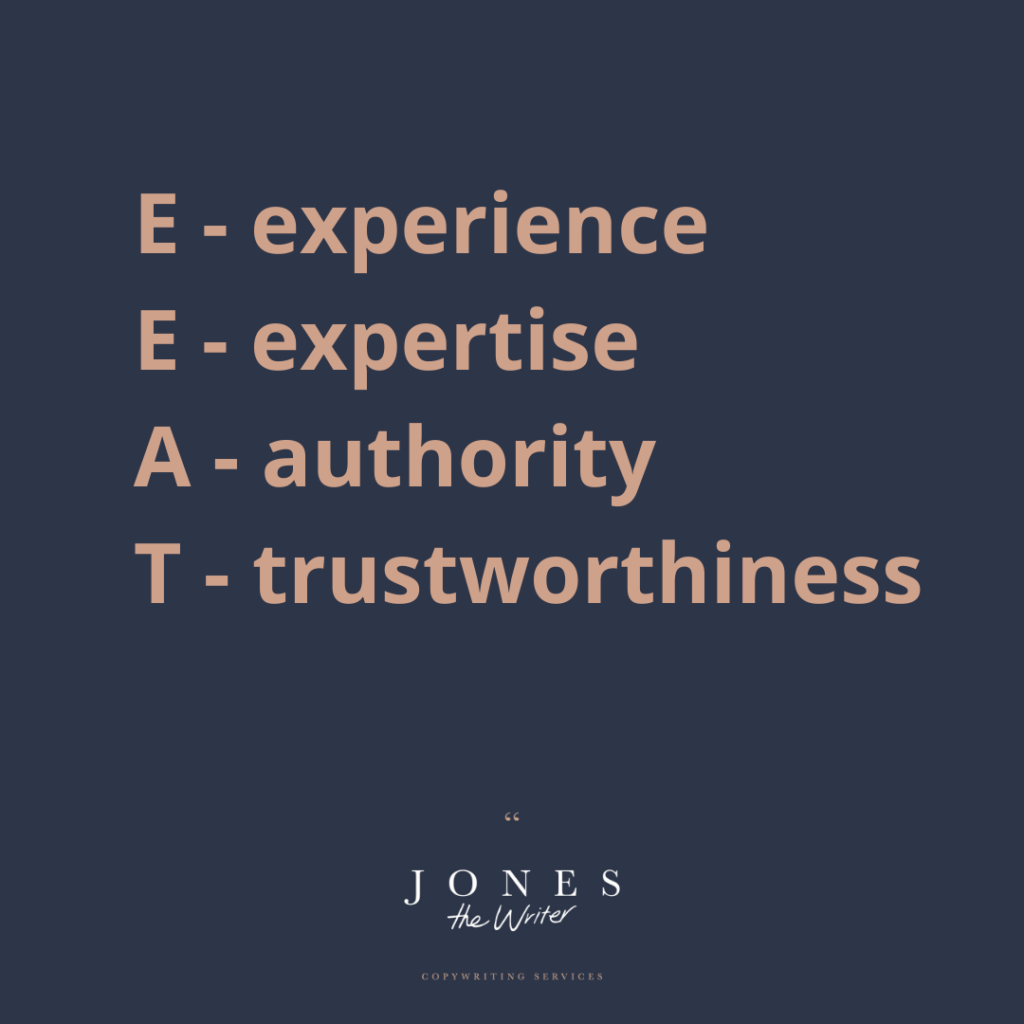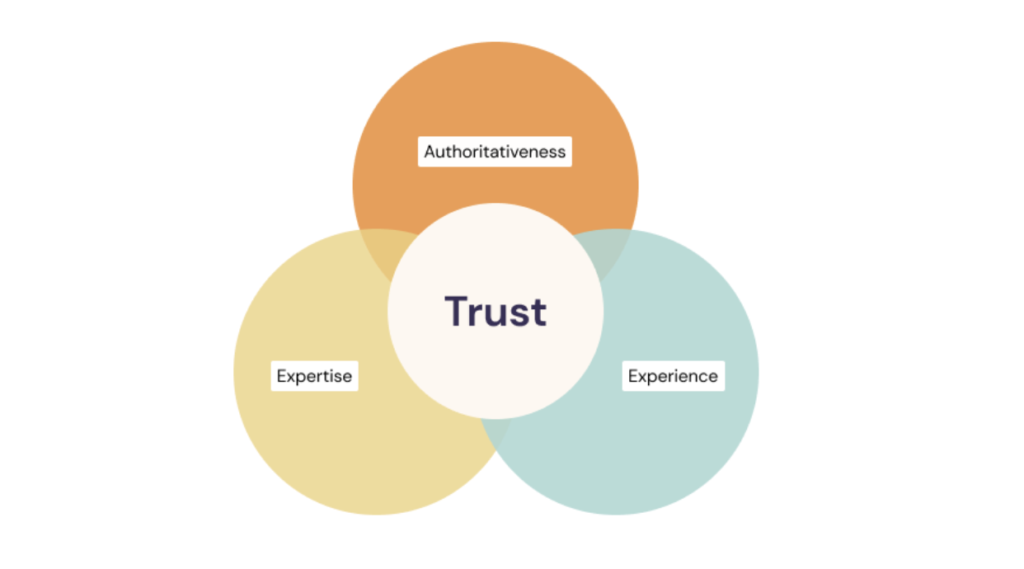What is EAT in SEO?
E-A-T stands for expertise, authoritativeness, and trustworthiness. These are key factors that Google’s algorithms consider when ranking websites in search results. Google wants to provide its users with the most relevant and trustworthy results, so it looks for websites that have credibility and are written by experts on the topic. So the handy acronym, EAT, is paramount to keep at the forefront of your mind when creating content for your website if you want it to rank well.
Now, EAT are not direct ranking factors (such as page speed, keywords etc). Still, they are taken into account when Google “looks” at websites overall and are laid out in Google’s Quality Rater Guidelines.
The Google Quality Rater Guidelines are a set of guidelines used by human evaluators, known as “raters,” to assess the quality of search results returned by the Google algorithm. These guidelines provide information on what constitutes high-quality content, how to evaluate the credibility of sources, and how to determine the relevance of a result to a user’s query. The guidelines are used to help ensure that the search results provided by Google are of the highest quality and relevance to users.
Expertise refers to the knowledge and skill of the content creators on a particular subject. This can be demonstrated through credentials, education, and experience.
Authoritativeness refers to the website’s reputation and influence on the topic it covers. A website widely recognised as a leading source of information on a particular topic is considered more authoritative than a website with less recognition.
Trustworthiness refers to the website’s reliability and honesty. This can be demonstrated through transparent business practices, accurate and verifiable information, and security measures to protect users’ privacy.
I will say that, in general, it’s important for a website to have high levels of E-A-T in order to rank well in search results and be considered a reliable source of information by Google.

But there’s now more to EAT – an extra E
In December 2022, there was a google update of guidelines that included an additional part to the acronym: an extra E. Making the full acronym E-E-A-T. This extra E stands for “experience”.
Google states the following: ‘Experience: Consider the extent to which the content creator has the necessary first-hand or life experience for the topic. Many types of pages are trustworthy and achieve their purpose well when created by people with a wealth of personal experience. For example, which would you trust: a product review from someone who has personally used the product or a “review” by someone who has not?’
What is trustworthiness in SEO?
In the context of search engine optimisation (SEO), trustworthiness refers to the credibility and reliability of a website. Trustworthiness is an important factor that search engines consider when ranking websites in their search results, as it helps to ensure that users are presented with high-quality and reliable sources of information. There are several ways a website can demonstrate trustworthiness to search engines, including having a clean and secure website, having a professional design, having a clear and easily navigable structure, and having high-quality and informative content. Additionally, having a good track record and positive reputation can also help to increase a website’s trustworthiness.
How can you achieve trustworthiness for SEO?
There are several ways that you can work to increase the trustworthiness of your website for SEO purposes:
- Publish high-quality and informative content: By consistently publishing high-quality, well-researched, and informative content, you can establish your website as a reliable source of information.
- Design a professional and user-friendly website: A well-designed, easy-to-navigate, and professional website can help establish trust with users and search engines.
- Use a secure connection: Ensuring that your website uses a secure connection (HTTPS) can help to protect user data and show search engines that you are committed to security.
- Use reliable sources: If you include information from external sources on your website, use reliable sources to back up your claims. This can increase the trustworthiness of your content. One of the modules of my online blogging course talks you through in-depth research.
- Be transparent: Disclose any conflicts of interest or biases that you may have, and be open and honest about your business practices. This can increase the trust that users and search engines have in your website.
When creating their SEO content strategy, I always encourage clients to start with decent cornerstone content (before they start blogging about the “fun” stuff) that highlights their proficiency in their field, no matter the industry.
Cornerstone content is a term used to describe the most critical and comprehensive content on a website. It is called “cornerstone” content because it serves as the foundation of a website and provides a structure for the rest of the content on the site. Cornerstone content is typically in-depth, well-researched, and evergreen (meaning it will remain relevant for a long time). It is often the website’s main attraction and is designed to be the go-to resource for a particular topic. Examples of cornerstone content might include a detailed guide, an informative video, or a comprehensive review. As an example, some cornerstone content for a copywriter might be an in-depth post about the history of copywriting.
This is what Google says about trust:
Consider the extent to which the page is accurate, honest, safe, and reliable.
The type and amount of trust needed depends on the page, for example:
Online stores need secure online payment systems and reliable customer service.
Product reviews should be honest and written to help others make informed purchasing decisions (rather than solely to sell the product).
Informational pages on clear YMYL topics must be accurate to prevent harm to people and society.
Social media posts on non-YMYL topics may not need a high level of trust, such as when the purpose of the post is to entertain its audience and the content of the post does not risk causing harm.’

How can you be an expert in your field for SEO?
To be seen as an expert in your field for SEO purposes, you can follow these tips:
- Gain relevant education and qualifications: Having a degree or other formal education in your field can help to establish your expertise. This isn’t entirely necessary, but if you do happen to have qualifications in your industry, you might like to let people know on your About page or web bio or even point to it in some content articles.
- Build a solid foundation of knowledge: Make sure you have a thorough understanding of your field and stay up-to-date on the latest developments and trends. Facts, statistics and resources need to be current and accurate. Having inaccurate or unreliable sources can potentially harm the way that Google sees your site.
- Share your expertise through content creation: One of the best ways to demonstrate your expertise is by creating high-quality, well-researched, and informative content. This can include blog posts, articles, guides, videos, and other forms of content. And if you prefer to stick to one type of asset (like I do with blogging), it’s a good idea to add in different asset types occasionally.
- Engage with your community: Participating in industry forums, social media groups, and other online communities related to your field can help to establish your expertise and build your reputation, as well as followers or fans that trust in your knowledge.
- Include client case studies on your website.
- Include appropriate terms and conditions, privacy policy, contact details and disclaimer pages.
- Link to high authoritative web pages and sites.
- Get other people to link back to your website.
Essentially, your whole website should be obviously set up to immediately announce what you do and what industry you are in. If you look at my website, my home, about and copywriting services pages, all clearly state my areas of expertise and experience and are optimised for specific industry-related SEO keywords. Then my blog post content solidifies these claims and points towards what I offer professionally.
You could still start a blog and rank well without having to work or be an expert in your field, but it’s going to be easier, following the EEAT formula, if you demonstrate your expertise on your website towards your chosen blog topics. For example, if you’re a travel blogger, be sure to include on your home and about pages why you are best placed to talk about the things you will blog about. The same goes if you are an accountant, artist or car blogger!
If you aim to be super helpful to whoever will happen across your website by providing quality information and guidance, as well as personal opinion, you will be on the right track.
An SEO expert case study

Neil Patel is a well-known digital marketer and entrepreneur who has gained a reputation as a bonafide SEO expert. If you ever want to learn more about SEO, he is an excellent resource, and I cannot recommend his resources and knowledge enough.
To ensure his own website adheres to the EEAT principles, he regularly puts out expert content that is both helpful and sticks to his clear tone of voice.
Here are a few things that Neil Patel does to establish his expertise in SEO:
- Consistently produces high-quality content: Neil Patel has a popular blog where he consistently publishes in-depth and informative articles on SEO and other topics related to digital marketing.
- Offers SEO consulting services: Neil Patel has a successful consulting business where he works with clients to help them improve their SEO strategies.
- Speaks at industry events: Neil Patel is a popular speaker at industry events and conferences, where he shares his knowledge and insights on SEO and other topics.
- Collaborates with other industry experts: Neil Patel frequently collaborates with other experts in the field and shares their knowledge and insights on his blog and other platforms.
- By consistently producing high-quality content, offering consulting services, speaking at industry events, and collaborating with other experts, Neil Patel has been able to establish himself as an authority on SEO and build a reputation as an expert in the field.
What kind of blog posts does Neil Patel publish?
- Neil Patel has a popular blog where he publishes articles on a wide range of topics related to SEO, digital marketing, and entrepreneurship. Some examples of the types of blog posts that Neil Patel publishes include:
- In-depth guides and tutorials: Neil Patel often publishes long-form articles that go into detail on specific topics, such as how to conduct keyword research, how to create a content marketing strategy, and how to use social media for business.
- Industry news and updates: Neil Patel keeps his readers up-to-date on the latest developments and trends in the world of SEO and digital marketing.
- Personal stories and experiences: Neil Patel also shares personal stories and experiences on his blog, offering insights and lessons learned from his own journey as an entrepreneur and digital marketer.
- Interviews with industry experts: Neil Patel frequently interviews other experts in the field and shares their knowledge and insights on his blog.
By publishing a mix of in-depth guides, industry news, personal stories, and expert interviews, Neil Patel’s blog has become a go-to resource for those interested in SEO and digital marketing.
If you want to write blog posts that really nail the EEAT fundamentals, register for my online blogging course now.




